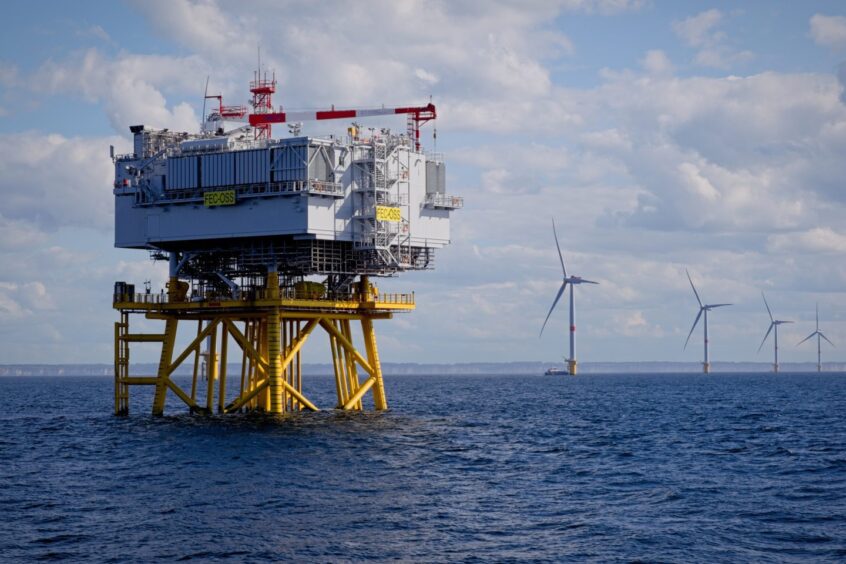
Paula Kidd and David Rutherford, Energy Partners at CMS, discuss the transition to offshore wind.
-
Some Energy Voice online content is funded by outside parties. The revenue from this helps to sustain our independent news gathering. You will always know if you are reading paid-for material as it will be clearly labelled as “Partnership” on the site and on social media channels,
This can take two different forms.
“Presented by”
This means the content has been paid for and produced by the named advertiser.“In partnership with”
This means the content has been paid for and approved by the named advertiser but written and edited by our own commercial content team.
The UKCS is increasingly recognised not just as the home of offshore oil and gas, but the offshore energy industry. As part of the energy transition, increasing numbers of oil and gas companies have diversified their portfolios into offshore wind. The work force is also transitioning.
There is therefore perhaps an inevitability to the offshore wind industry looking at working practices which can be adapted from offshore oil and gas.
Standard contract terms
It has therefore been identified that updated standard form contracts are required.” – CMS
One of the pillars of contracting in the offshore oil and gas industry has been the use of standard contract terms, developed by the industry for the industry.
The LOGIC series of standard contracts provide a recognised starting point for negotiating terms for a range of different contract types. Depending on the subject matter (and sometimes the negotiating position of the parties) involved, there will usually be a need to amend or supplement those terms.
However, the benefit of a recognised starting point allows parties to quickly identify the areas on which to focus their negotiations, rather than having to spend time agreeing a contract form, or adopting something which favours one party or another.
Given the scale and speed at which offshore wind projects are likely to be delivered, the use of standard form contracts intuitively feels like something from which the offshore wind industry would benefit; but what standard form contract should be used?
To the extent that standard forms have been used so far, the FIDIC suite of contracts has been broadly used in the offshore wind sector, often subject to (very) heavy modifications.
The time spent drafting, negotiating and understanding the modifications (and the appropriateness of terms being backed off down the supply chain) is impacting economies of scale of the offshore wind industry. It has therefore been identified that updated standard form contracts are required.
LOGIC has identified there may be a place in the market for a LOGIC offshore wind contracts, and it has started a process of creating these amongst a group of its members.
Whatever approach might be taken to standard contract terms in the offshore wind space, the key to their use is likely to be found in ensuring they strike the correct balance, are fit for the part of the work to which they apply and are user friendly.
Decommissioning
Notwithstanding that offshore wind remains a new industry, OEUK expects decommissioning activity to begin in 2030 as some of the earliest and smallest (capacity wise) turbines reach the end of their life.
In anticipation of these projects, in November 2024 OEUK released guidance on “Designing for Decommissioning of Offshore Wind”.
The guidance focuses on the importance of considering a decommissioning plan during the installation phase of a project, which is a key lesson which has been learned by the oil and gas industry as its own decommissioning journey ramps up.
Other elements, notably the detailed summary on post-decommissioning responsibility, compare the decommissioning obligations imposed on the owners of oil and gas structures to those of wind farms.
OEUK has also released separate guidance which provides a high-level overview of decommissioning project elements and the associated costs: the ‘Offshore Wind Work Breakdown Structure’.
The oil and gas industry has reaped benefits from the Oil and Gas Work Breakdown Structure as it enables operators, regulators and developers to compare and benchmark projects and identify cost reductions.
Hopefully this benefit, already realised by the oil and gas industry as it has learned on the job, can be transferred to the offshore wind industry from the outset.
Conclusion
The wealth of experience held by the offshore oil and gas sector in the UK is already exported the world over (and has been for decades); the offshore wind sector in the UK stands to benefit well from that heritage.
Standard contracts and decommissioning are only two areas of that experience. Efficient transfer of skills will be key to an energy transition towards the use of multiple energy sources.
Recommended for you
